April 4, 2007
1:19 P.M. PDT
THE PRESIDENT: Thank you, all. (Applause.) I've been waiting all day to say, Hoo-ah!
AUDIENCE: Hoo-ah!
THE PRESIDENT: Thank you for greeting me. General Cone1, thanks. I appreciate your service to our country and thanks for leading these men and women. I'm honored also to be with Jill. Thank you for joining us today for lunch. Command Sergeant2 Kim Boyink has been a generous host. Sarge, I appreciate being with you. Thank you for your service. Thanks for setting such a good example for the enlisted3 folks.
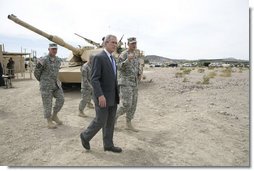 I often tell people that the backbone4 of the Army is the sergeant.
I often tell people that the backbone4 of the Army is the sergeant.
AUDIENCE: Hoo-ah!
THE PRESIDENT: And I appreciate you sergeants5 who have joined us here, and I appreciate you serving.
I want to thank two members of the United States Congress who have traveled with me today, men who have concerns about Fort Irwin and have reflected those concerns in different appropriations6 measures in the United States Congress. In other words, they understand the importance of this mission and they understand the importance of making sure the folks who are stationed here have the best possible housing and food -- could work a little bit on it, but -- (laughter.)
But I do want to introduce to you the Congressmen from this district, Congressman7 Buck8 McKeon -- where are you, Buck? There he is. Thanks, Buck. (Applause.) And Congressman Jerry Lewis, ranking member of the Appropriations Committee. (Applause.)
I'm proud to be here with Mayor Dale, of the city of Barstow. I appreciate you coming, Mr. Mayor. (Applause.) Nice of you to be here. Thanks for being here.
I appreciate not only those who wear the uniform who are here today, I want to thank your families, too, for coming. It means a lot to me to be with our military families. I'll say a word about our military families here in a minute.
I do want to thank those who have just returned from Afghanistan, the 699th Maintenance Company.
AUDIENCE: Hoo-ah. (Applause.)
THE PRESIDENT: I guess the best words I can say are, welcome -- I mean, thanks and welcome back. We're glad you're here.
I appreciate those of you who are about to deploy9 in an important theater in this war against radicals10 and extremists, this war on terror, the "Red Devils" of the 58th Engineers, the "Renegades" of the 557th Maintenance Company, the "Super HETT" of the 2nd Transportation Company. I appreciate your -- (applause.)
Ours is a remarkable11 country when people volunteer to serve our country in a time of war. The amazing thing about our United States military is thousands and thousands have signed up knowing full well that we're a nation at war. The government didn't say, you have to do this, you chose to do it on your own. You decided12 to put your country ahead of self in many ways. I'm proud to be the Commander-in-Chief of such decent people, such honorable people, and such noble people. And I'm proud to be in your presence today.
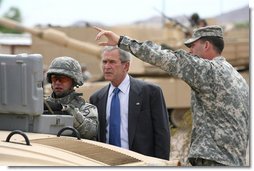 I also want to thank the families. I understand how difficult this war is on America's military families. I understand the rotations13 are difficult for the moms and husbands, and sons and daughters. I understand that when a loved one is deployed14, it creates anxiety. I also understand our military families are very supportive of those who wear the uniform. And so, on behalf of a grateful nation, I say thanks to the families who are here, and all across the United States of America. You're an integral part of making sure this volunteer army is as successful as it is today.
I also want to thank the families. I understand how difficult this war is on America's military families. I understand the rotations13 are difficult for the moms and husbands, and sons and daughters. I understand that when a loved one is deployed14, it creates anxiety. I also understand our military families are very supportive of those who wear the uniform. And so, on behalf of a grateful nation, I say thanks to the families who are here, and all across the United States of America. You're an integral part of making sure this volunteer army is as successful as it is today.
This country's life changed on September the 11th, 2001, and my attitude about the world changed that day, too. I decided that I -- that our most important task in Washington was to protect you, protect the American people. And I decided that I would use all the resources at our disposal to do that. Like many Americans, we struggle with understanding with what this attack meant. But if you think about the lead-up to the attack, you think about the terrorist attack on the World Trade Center in 1993, or the extremist attack on our troops in Lebanon, or the embassies in Africa; Khobar Towers in Saudi Arabia; or the USS Cole.
In other words, the attack on September the 11th wasn't the first move by the extremists. As a matter of fact, they conducted their acts of murder believing that there wouldn't be a response. They became convinced that free nations were weak. And they grew bolder believing that history was on their side.
After the attacks of September the 11th I vowed16 to our country that we wouldn't tire, that we would use whatever it took to protect us. And so we changed our strategy. The strategy is to defeat the enemy overseas so we don't have to face them here at home. The strategy is to find those who would kill Americans and bring them to justice. So for those of you in -- who have been in Afghanistan, you're helping17 this young democracy recover from a period of time in which brutal18 extremists provided safe haven19 to an enemy which attacked the United States. Part of our doctrine20 is if you harbor a terrorist, you're equally as guilty as the terrorists.
Another part of the doctrine is when you see a threat, we must take threats seriously, before they come here to hurt us. See, what changed on September the 11th is oceans can no longer protect the people in the United States from harm. I saw a threat in Saddam Hussein. The world is better off without Saddam Hussein in power. And so are the citizens of Iraq.
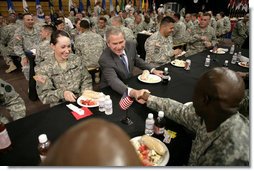 In the long-term, we must remember that freedom is universal, and the best way to defeat an ideology21 -- and make no mistake about it, these extremists believe things -- for example, they don't believe you can worship freely; they don't believe you should speak your mind; they don't believe in dissent22; they don't believe in human rights. We believe in the right for people to worship. We believe in the dignity of each human being. Our ideology is based on the universality of liberty. Their dark ideology is based upon hatred23. And the way to defeat -- ultimately defeat those who would do harm to America is give people a chance to live in a free society.
In the long-term, we must remember that freedom is universal, and the best way to defeat an ideology21 -- and make no mistake about it, these extremists believe things -- for example, they don't believe you can worship freely; they don't believe you should speak your mind; they don't believe in dissent22; they don't believe in human rights. We believe in the right for people to worship. We believe in the dignity of each human being. Our ideology is based on the universality of liberty. Their dark ideology is based upon hatred23. And the way to defeat -- ultimately defeat those who would do harm to America is give people a chance to live in a free society.
And that's the work we're doing, whether it be in Afghanistan or in Iraq. And I want to thank you for your sacrifice and service.
Iraq, obviously, has got the attention of the United States, as it should. It's a tough war. The American people are weary of this war. They wonder whether or not we can succeed. They're horrified24 by the suicide bombings they see. I analyzed26 all the situation here this fall -- I listened to the advice from the military, I listened to the advice from the political people -- all in reaction to the fact that al Qaeda and the extremists bombed a sacred place, which caused sectarian violence to begin to rage. And it looked like that if action wasn't taken, the capital of this young democracy would be overwhelmed by chaos27.
And I had a choice to make, and that is whether or not to pull back and hope that chaos wouldn't spread, or to do something about the sectarian violence that was taking place and to help the Iraqis bring order to their capital in order to give them breathing space, time to reconcile their differences after having lived under the thumb of a tyrant28 for years.
In weighing the options I thought about the consequences of a country that could sustain itself and defend itself and serve as an ally in the war on terror. And those consequences will have profound impact over the next years, over the decades, to know that in the midst of the Middle East there can flourish free societies, societies where people can live together, societies where people can express their opinions, societies where people can live a free life.
That's important because history has proven, has shown that free societies don't war with each other. But it's also important to have allies in this war against the extremists who would do us harm.
I've also thought about the consequences of failure and what it would mean to the American people. If chaos were to reign29 in the capital of that country it could spill out to the rest of the country; it could then spill out to the region, where you would have religious extremists fighting each other with one common enemy, the United States of America, or our ally, for example, like Israel.
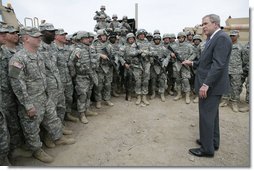 The enemy that had done us harm would be embolden30. They would have seen the mighty31 United States of America retreat before the job was done, which would enable them to better recruit. They have made it clear -- they, being people like Osama bin25 Laden32 or Zawahiri -- have made it clear they want to drive us from Iraq to establish safe haven in order to launch further attacks. In my judgment33, defeat -- leaving before the job was done, which I would call defeat -- would make this United States of America at risk to further attack.
The enemy that had done us harm would be embolden30. They would have seen the mighty31 United States of America retreat before the job was done, which would enable them to better recruit. They have made it clear -- they, being people like Osama bin25 Laden32 or Zawahiri -- have made it clear they want to drive us from Iraq to establish safe haven in order to launch further attacks. In my judgment33, defeat -- leaving before the job was done, which I would call defeat -- would make this United States of America at risk to further attack.
In other words, this is a war in which, if we were to leave before the job is done, the enemy would follow us here. That's the lesson of September the 11th. It's an integral part of my thinking about how to secure this country -- to do the most important job that the government must do, and that is to protect the American people.
So I made a decision, in consultation34 with our military commanders, people of sound military judgment; people who have made a career about how to set strategies in place to achieve military victories. And the new strategy we developed was to, rather than retreat, reenforce; rather than pull back was to go in with additional troops to help this young democracy do the job that the 12 million people who voted in free elections want them to do, which is to provide security, so a mother can raise her child the way we would want our mothers to be able to raise our children; to provide security so that the political reconciliation35 necessary can go forward in a more secure environment.
As I made the decision to send in more troops, I also made the decision to send in a new commander, General David Petraeus. He's an expert on counter-insurgency. Right now about half of the reinforcements that are expected to go to Baghdad have arrived. American and Iraqi troops are, however, on the move. They're rounding up both Shia and Sunni extremists; they're rounding up those who would do harm to innocent people.
We're after al Qaeda. After all, al Qaeda wants us to fail because they can't stand the thought of a free society in their midst. We're destroying car bomb factories, killing36 and capturing hundreds of insurgents37. And neighborhoods are being reclaimed38. There is progress, but the enemy sees that progress and they're responding in a brutal way.
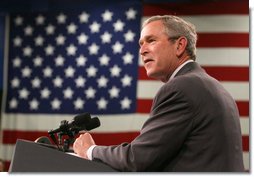 I was amazed by the story of the extremists who put two children into a automobile39 so that they could make it into a crowded area -- then they got of the car and blew up the car with the children inside. It only hardens my resolve to help free Iraq from a society in which people can do that to children, and it makes me realize the nature of the enemy that we face, which hardens my resolve to protect the American people. The people who do that are not people -- you know, it's not a civil war; it is pure evil. And I believe we have an obligation to protect ourselves from that evil. So while we're making progress, it also is tough. And so the way to deal with it is to stay on the offense40, is to help these Iraqis.
I was amazed by the story of the extremists who put two children into a automobile39 so that they could make it into a crowded area -- then they got of the car and blew up the car with the children inside. It only hardens my resolve to help free Iraq from a society in which people can do that to children, and it makes me realize the nature of the enemy that we face, which hardens my resolve to protect the American people. The people who do that are not people -- you know, it's not a civil war; it is pure evil. And I believe we have an obligation to protect ourselves from that evil. So while we're making progress, it also is tough. And so the way to deal with it is to stay on the offense40, is to help these Iraqis.
I had a meeting, a SVTS -- what they call a SVTS, it's a real-time video conference -- with Prime Minister Maliki. I urged him, of course, to continue making the actions necessary to reconcile in their society: pass an oil law, a de-Baathification law. It's interesting to watch a government emerge. It's interesting to watch this new democracy begin to take on responsibilities. And they are. They said they would commit additional troops into Baghdad; they have. They said they'd name a commander for the city of Baghdad; they did. They said they would man checkpoints; they are. They said they'd spend a significant amount of their own money for their reconstruction41; they have -- budgeted $10 billion.
And there's more work to be done. And I reminded the Prime Minister of that. And I reminded him that our patience is not unlimited42. I also reminded him that we want him to succeed, that it's in the interest of the United States that this young democracy succeed. It's in the interest we gain a new ally in the war on terror, in the midst of a part of the world that produced 19 kids that came and killed 3,000 of our citizens.
Just as the strategy is starting to make inroads, a narrow majority in the Congress passed legislation they knew all along I would not accept. Their bills impose an artificial deadline for withdrawal43 from Iraq. Their bills substitute the judgment of Washington politicians for the judgment of our military commanders. Their bills add billions of dollars in pork barrel spending, spending that is unrelated to the war that you're engaged in. Then, instead of sending an acceptable bill to my desk, they went on spring break.
In the meantime, the clock is ticking for our military. The Secretary of Defense44, the Chairman of the Joint45 Chiefs of Staff, and the Chief of Staff of the Army have warned that if Congress delays these funds past mid-April, we'll have significant consequences for our Armed Forces. Army Chief of Staff says this: "Without approval of the supplemental funds in April, we will be forced to take increasingly draconian46 measures, which will impact Army readiness and impose hardship on our soldiers and their families."
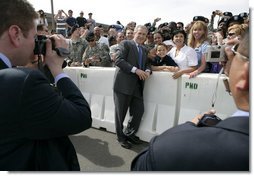 For example, the Army says that without these funds, it will be forced to consider cutting back on training for Guard and Reserve units, and eventually for active duty personnel. The folks at Fort Irwin know firsthand how important training is. Washington has a responsibility to ensure that you have the resources you need to keep this training going.
For example, the Army says that without these funds, it will be forced to consider cutting back on training for Guard and Reserve units, and eventually for active duty personnel. The folks at Fort Irwin know firsthand how important training is. Washington has a responsibility to ensure that you have the resources you need to keep this training going.
Soon Congress will return from its break. I urge them to work on legislation to fund our troops, but that does not tell our military how to conduct war and sets an artificial timetable for withdrawal. The enemy does not measure the conflict in Iraq in terms of timetables. They plan to fight us, and we've got to fight them, alongside the Iraqis. A strategy that encourages this enemy to wait us out is dangerous -- it's dangerous for our troops, it's dangerous for our country's security. And it's not going to become the law.
There are fine, fine people debating this issue in Washington, D.C. They're patriotic47. They're people who have got passionate48 points of view about this war. And I understand that. Yet, we cannot allow honest differences in Washington to harm our troops in battle, or their families here at home. Members of Congress have sent their message; now they need to send me a war-spending measure that I can sign into law, so we can provide our troops and their families with the funds and support they deserve and they need.
I spent some time with the soldiers out in the field, and I want to share with you what I told them. The work that you have volunteered to do will have a lasting49 impact on the world in which we live. When we succeed in helping this Iraqi government become a country that can sustain itself, defend itself, govern itself, and serve as an ally in the war on terror, we will have delivered a significant blow to those who have designs on harming the American people, because they can't stand the thought of free societies in their midst. They can't stand the thought of people being able to have a government of, by, and for the people. It is the opposite of what they do.
But we have done this kind of work before. The United States of America has done the kind of work that spread liberty in parts of the world where people never thought liberty could take hold. For example, after World War II, after we had a brutal war with the Japanese and Nazi50 Germany, our troops stayed behind and helped these societies recover and grow and prosper51. And now we're reaping the benefits of helping our former enemies realize the blessings52 of liberty. Europe is free and at peace.
You know, after the Korean War, if you had asked somebody, can you imagine an American President being able to stand up in front of some troops and say the Far East is peaceful, a part of the world where we lost thousands of our troops in World War II and Korea is now a relatively53 peaceful part of the world, they would have said what a hopeless idealist that person is. And yet, I can report to you that. And I believe it is because our troops not only helped in Korea and helped rebuild Japan, but I believe it's because the presence of the United States gave breathing space to people to realize the blessings of liberty.
I believe liberty is universal. I don't believe it is just for the United States of America alone. I believe there is an Almighty54, and I believe the Almighty's gift to people worldwide is the desire to be free. And I think, if given a chance, people will seize that moment. And that's the work you're doing.
And so that's why I report to our citizens that the hard work we're doing today is laying the foundation of peace for generations to come. And it gives me great confidence to know that standing15 with the President of the United States is a fantastic military, well-trained, courageous55, and dedicated56 to protecting this country.
I'm proud to be your Commander-in-Chief. May God bless you all. (Applause.)
END 1:44 P.M. PDT
 收听单词发音
收听单词发音 
 I often tell people that the
I often tell people that the  I also want to thank the families. I understand how difficult this war is on America's military families. I understand the
I also want to thank the families. I understand how difficult this war is on America's military families. I understand the  In the long-term, we must remember that freedom is universal, and the best way to defeat an
In the long-term, we must remember that freedom is universal, and the best way to defeat an  The enemy that had done us harm would be
The enemy that had done us harm would be  I was amazed by the story of the extremists who put two children into a
I was amazed by the story of the extremists who put two children into a  For example, the Army says that without these funds, it will be forced to consider cutting back on training for Guard and Reserve units, and eventually for active duty personnel. The folks at Fort Irwin know firsthand how important training is. Washington has a responsibility to ensure that you have the resources you need to keep this training going.
For example, the Army says that without these funds, it will be forced to consider cutting back on training for Guard and Reserve units, and eventually for active duty personnel. The folks at Fort Irwin know firsthand how important training is. Washington has a responsibility to ensure that you have the resources you need to keep this training going. 

